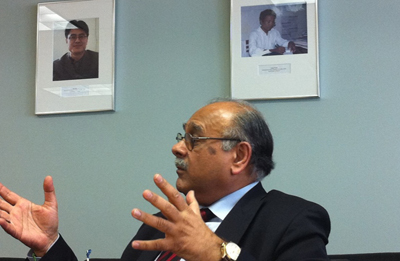Pakistani journalist Najam Sethi was in the United States last week to talk about the challenges facing his country at a critical moment. Ever the contrarian, he also sees opportunities. “For the first time the media is challenging the military,” he told an audience of friends and colleagues at CPJ offices in New York. “That’s the biggest positive development out of the whole Pakistan debacle.”
He was referring, of course, to the “OBL incident”–when, during the early morning hours of May 2, a commando unit of U.S. Navy Seals infiltrated Pakistan and carried out a raid that killed Al-Qaeda leader Osama Bin Laden. The attack occurred in the garrison town of Abbottabad, home of the country’s most prestigious military academy and a popular retirement destination for former generals and army officers.
Sethi–editor of The Friday Times and host of a popular Urdu-language political program on Geo TV–notes that the focus of the Pakistani media has not been on how Bin Laden was able to find sanctuary in the country. Instead, attention has turned to the effectiveness of the Pakistani military and intelligence services. “If you don’t have the ability to stop two U.S. helicopters from coming in and wreaking havoc, why are we giving you billions of rupees every year?” Sethi asked, echoing a question he says is reverberating across the media spectrum–from the elite English-language press to the populist Urdu-language broadcasters.
Sethi was in the United States for the launch of a report issued by the Asia Society, “Pakistan 2020: A Vision for Building a Better Future.”
“The civil-military imbalance is finally being questioned,” Sethi said, by journalists and by opposition leaders. He credited former prime minister Nawaz Sharif, leader of the Pakistan Muslim League-Nawaz (PML-N), for pushing for an independent inquiry into the U.S. operation in Abbottabad and parliamentary scrutiny of the military and intelligence budgets–both audacious moves in the context of the military’s dominance in Pakistan.
Sethi, who has long argued for improved bilateral relations with neighboring India, also noted Sharif’s controversial remarks last week calling for Pakistan to stop treating India as its “biggest enemy.” The prevailing national security paradigm, centered on perceived threats from arch-rival India, provides the basis for the “military’s political supremacy over the civilians and economic stranglehold over the national budget,” Sethi wrote in a recent editorial for The Friday Times.
It was interesting to hear Sethi’s take on Nawaz Sharif’s latest political incarnation. Twelve years ago, Sethi was one of the targets of then-Prime Minister Sharif’s crackdown on critical journalists. Sethi was taken into custody in a brutal pre-dawn attack on his home on May 8, 1999, when dozens of government agents broke into the house. Officers pulled Sethi out of bed, and beat him with clubs and handcuffs, according to his wife, publisher Jugnu Mohsin. When Mohsin asked the men to produce a warrant for the arrest, one of them threatened to shoot Sethi immediately and leave his corpse in place of any warrant. Sethi was held without charge for nearly a month. He was released only after a concerted campaign led by Mohsin and joined by CPJ and other international groups.
(Another high-profile target during that period was Hussain Haqqani, now Pakistan’s famously “silver-tongued” ambassador to the United States. On May 4, 1999, Haqqani–then a prominent journalist, political commentator, and leader of the opposition–was similarly abducted and detained for two months.)
Najam Sethi and Jugnu Mohsin received CPJ’s International Press Freedom Award in 1999. At the time, they asked us to watch their backs. Sethi made that request again during this visit, stressing the importance of international groups like CPJ and Human Rights Watch. “It’s rough out there,” Sethi said. “One never knows whether the Taliban is gunning for you or whether the agencies are gunning for you. And sometimes you don’t know because one is operating at the behest of the other.”
Pakistan was the deadliest country for journalists in 2010, with eight journalists killed in the line of duty, according to CPJ research. CPJ recently completed a mission to Pakistan, where we met with President Asif Ali Zardari and other senior political leaders to urge justice and accountability for attacks against journalists.
While Sethi still has to operate with caution, he hopes that his status as a senior citizen might give him some protection. “We’ve paid our dues,” he said. “And it could be counter-productive. They can’t take that risk. If they pick me up, I may have a heart attack and pop off.” He chuckled, reveling in the gallows humor.
“And I’m an equal-opportunity offender, so they leave me alone.”
We hope so. And we’ve got your back.
Kavita Menon is a senior program officer and former Asia program coordinator for CPJ. She has worked as a journalist and human rights researcher in countries including Afghanistan, Pakistan, India, Nepal, and Sri Lanka. Follow her on Twitter @kavita718.-
